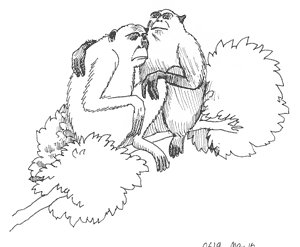STRANGE BUT TRUE- Sympathetic simians: Apes, chimps express empathy

DRAWING BY DEBORAH DERR McCLINTOCK
Q. Empathy and social reciprocity are at the root of the golden rule of "Do unto others" in religions and cultures worldwide. Guess where else these "pillars of human morality" show up. –D. Poist
A. In monkeys and apes, says primatologist Frans de Waal in Primates and Philosophers: How Morality Evolved. For example, after one chimpanzee has attacked another, it's not uncommon for a bystander to go over and embrace the victim; soon the screaming, yelping, and other signs of distress stop. In fact, so strong is this tendency that Russian scientist Nadia Ladygina-Kohts, who raised a juvenile chimp, said that if her charge escaped to the roof, holding out food would not entice him down. "The only way was to sit and sob as if she were in pain, whereupon the young ape would rush down to put an arm around her, a wounded expression on his face," deWaal writes.
Among groups in captivity, reciprocity too is evident. Studies show that when a chimp shares food with others, the sharer is more likely to be generous toward other chimps that have previously groomed it– an obvious keeping track of incoming and outgoing services.
A remarkable example of empathy comes from a study where rhesus monkeys learned to pull a chain to receive food, yet refused to pull it when doing so would shock a companion. "One monkey stopped pulling for five days, and another one for twelve days after witnessing the shock delivery. These monkeys were literally starving themselves to avoid inflicting pain upon another," he writes.
Q. Flip a U.S. Lincoln penny onto a tabletop 100 times and what'll it be, more heads or more tails? Now try spinning the penny instead. Finally, have a (very patient) friend balance 100 pennies on their edge, then slam the tabletop and see how they fall. Wouldn't you think about 50-50 in all three cases? – M. VosSavant
A. For flips of a "fair" coin, yes, but the Dizzy Lincolns will more likely settle with tails up, the Lincolns on Edge with heads up, say Edward Burger and Michael Starbird in The Heart of Mathematics. These are surprising results, due possibly to the penny's edge being slightly beveled, permitting an easier release from the mold during casting. So you wagerers, it's "heads you win" and "tails you win again," provided you select the right game each time!
Q. From head to toe, how many different varieties of hair do you grow and at what rates? –J. Carden
A. Two basic types, terminal hair for the scalp, eyebrows and eyelashes, and the usually softer vellus hair everywhere else, says primatologist Adrian Barnett in New Scientist magazine. Complex mechanisms of hormonal control spin these two types off into the nine or 10 varieties adults have, from leg hair to underarm to beards. Whether it's flowing shoulder-length locks or the tiniest toe fuzz, all grow at about 1-1.5 centimeters per month, with a short dormant spell before dropping out. Hair lifetimes determine maximum length, such as leg hairs lasting around two months, armpit hairs making it to six months, and head hair growing nonstop for six years and up.
Curiously, we hirsute humans are about the only mammals with continuously growing hair. As physiologist Arthur Neufeld and anthropologist Glenn Conroy point out, while the fur of other mammals just grows to a set length and then stops, our head hair could stick around for years getting longer and longer. "When," they ask, "have you ever seen a chimpanzee getting a haircut?"
Q. With gazillions of staphylococci adding their fishy or wet-diaper aromas to gazillions of micrococci that break down sweat into the anti-floral, anti-social notes of smokestack sulphur, rotten eggs, and Limburger cheese, is it any wonder that so many feet smell to high heaven? –M. Lorenzoni
A. Bare feet generally don't smell, shoes do, says author William A. Rossi (The Sex Life of the Foot and Shoe). Easy solution: Rotate your shoes, airing them out for at least 24 hours.
Next curiosity: Whose feet give off the bigger stink, men's or women's? Men's, because guys are more often wedded to a single pair of clodhoppers, donning them day after day. Plus, male toes are bigger and stick together more, so sweat gets stuck in between.
Typically, an adult foot has about 100,000 sweat glands, giving off about a cup a day. For snug shoes that don't "breathe," you can make that a pint.
Old-fashioned ready remedy, says University of California-Riverside microbiologist Michael D. Coffey, is to dunk one's dour dogs into some strong black tea for a good soaking. "The tannic acid kills the bugs," Coffey says.
Send strange questions to brothers Bill and Rich at [email protected].
#